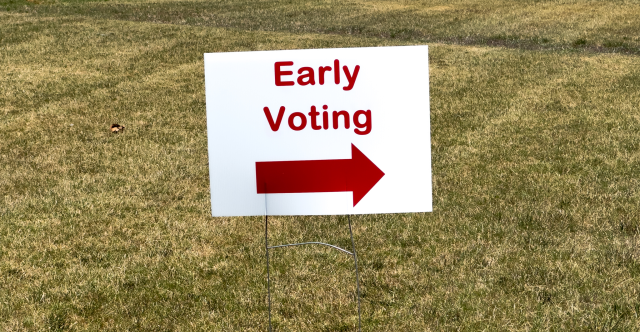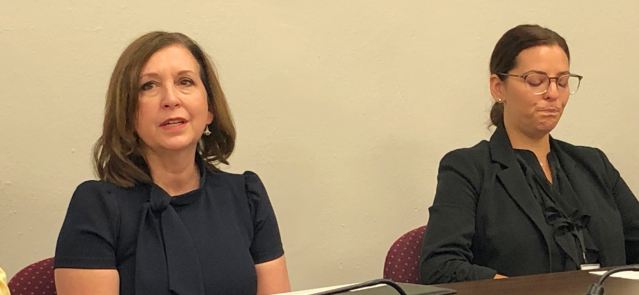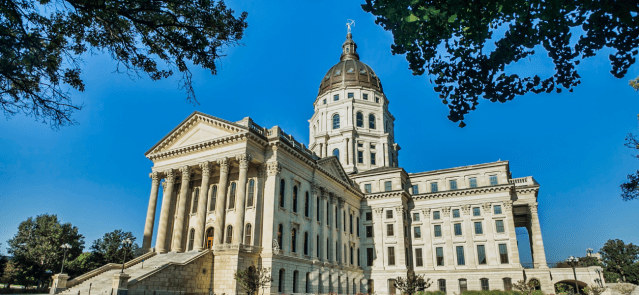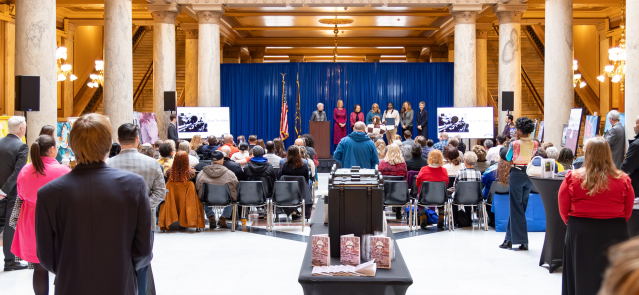While many candidates were out campaigning furiously during early voting in Thursday’s Republican and Democratic primary election, plenty of Tennessee voters responded with a shrug with figures showing far fewer people cast ballots in primary contests compared with a similar state and office ballot in 2020.
According to the Secretary of State, 353,774 voters cast ballots over the 14-day period which wrapped up on Saturday, a 39% drop over the 583,704 who showed up to vote during the early voting period four years ago.
On the Republican side, U.S. Sen. Marsha Blackburn is facing token opposition in her Republican primary election. There’s just one competitive U.S. House GOP primary contest among the eight Republican seats, that being in the 5th Congressional District contest between freshman Rep. Andy Ogles of Maury County and Nashville Metro Councilwoman Courtney Johnston.
The big difference between 2024 and 2020 is the lack of a marquee statewide Republican U.S. Senate contrast. Four years ago, Bill Hagerty, a Trump-endorsed former U.S. ambassador to Japan prevailed over physician Manny Sethi.
Democrats have a U.S. Senate Democratic primary headlined by state Rep. Gloria Johnson of Knoxville, one of the “Tennessee Three” who were temporarily expelled for participating in an impromptu House floor protest following last year’s mass shooting at a Nashville private school. But Johnson, who has $2 million in cash on hand, has competition from Memphis environmentalist Marquita Bradshaw who unexpectedly won Democrats’ nod in 2020 over better funded Nashville attorney James Mackler.
State races
There are also several seriously contested Republican races for state House and Senate seats this year. But heavy outside spending hasn’t resulted in a rush to the polls as GOP turnout was down 36%. It’s been even worse for Democrats, who have cast 46% fewer ballots than in 2020.
Early voting was up in some rural, often small counties where even just an eight-ballot increase could bump turnout percentages by nearly 3%. But a number of races have been won in the past by small margins.
Voter increases could make a substantial difference in some largely Republican counties. For example, the race for Senate District 18 in Sumner and Trousdale counties features Senate Republican Speaker Pro Tem Ferrell Haile of Gallatin and “Constitutional Conservative” Chris Spencer, also of Gallatin. Voting was up 19% in GOP primary voting in Sumner County, a 1,289-vote difference from 2020. The district also includes tiny Trousdale where early voting was down 56%.
Another hotly contested race is underway to succeed Republican Rep. Sam Whitson of Franklin. House District 65 is composed of part of Williamson County. Voting was down 9%, or 1,393 votes, compared with four years ago . The GOP primary features County Commission Chair Brian Beathard, attorney Michelle Foreman and businessman Lee Reeves, who has won Gov. Bill Lee’s endorsement as the Republican governor seeks voters to pass his statewide school voucher proposal.
Over in rural West Tennessee’s House District 73, incumbent Rep. Chris Todd of Jackson faces a GOP contest against Jimmy Harrison. The challenger is the former mayor of Madison County, where the early Republican turnout was up 9% during early voting.
In another rural West Tennessee House contest, incumbent Rep. Rusty Grills of Newbern is facing off with Bubba Cobb of Dyersberg. The Obion County portion of the district saw nearly a 40% drop off in voting from four years ago while Dyer County was up by about 5%. Lake County was down by 19%.
In Blount County’s House District 20 contest — where Republicans Nick Bright, attorney, businessman Jason Emert and retired teacher and coach Tom Stinnett are running for the seat vacated by Rep. Bryan Richey — Republican early voting dropped 19%. Emert has been endorsed by Lee in the governor’s quest to pass a statewide school voucher bill.
In Upper East Tennessee’s Senate District 4, Senate Education Chair Jon Lundberg of Bristol and challenger Bobby Harshbarger are tangled in a ferocious race where spending has approached $2 million. Republican early voting was down 17% in Sullivan County and dropped by 25% in Hawkins County.
Reps. Sam McKenzie faces Country Commissioner Dasha Lundy in the Democratic primary for House District 15 in Knox County, where voting has been down 24%. Fellow Democratic Rep. Yusuf Hakeem is being challenged by Chattanooga City Council member Demetrus Coonrod in Hamilton County, where primary voting has dropped 44% compared with four years ago.






